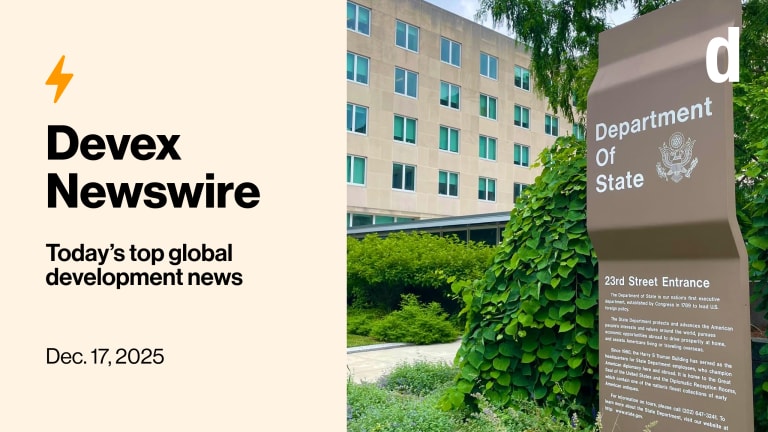
LONDON — The head of Save the Children, Kevin Watkins, compared the sexual abuse scandal currently rocking the aid sector to the 2008 financial crisis, describing aid agencies as “too big, too confident, too exuberant,” and having “too much belief in their own power.”
Speaking at the Bond conference in London on Monday, Watkins said the issue of sexual exploitation, abuse, and harassment within the sector was “systemic.” He also owned up to the failings of his own organization, which is set to undergo an independent inquiry after reports that two former senior directors allegedly harassed younger female colleagues.
“This is our 2008 financial crisis moment … [which] happened because of institutions that got too big, too confident, too exuberant, had too much belief in their own power, who refused to look at their own organizational cultures and what they were doing to people internally,” he said, adding that “we cannot afford to repeat those mistakes.”
“This is our 2008 financial crisis moment, which happened because of institutions that got too big, too confident, too exuberant, had too much belief in their own power.
— Save the Children CEO Kevin WatkinsSave the Children has been mired in controversy in recent weeks after news broke that Brendan Cox, former policy director at the charity, had been suspended in 2015 for “inappropriate behavior” toward female staff. Cox resigned before a disciplinary process was completed. Days later, it emerged that Justin Forsyth, former chief executive of Save the Children, had also been accused of inappropriate behavior and comments toward female coworkers. He left the charity in 2015 with a reference and went on to become deputy director of UNICEF. Forsyth resigned from that position last week.
The news comes in the wake of newspaper reports that a group of Oxfam staff, including a country director, engaged in sexual exploitation and bullying, including paying vulnerable women for sex in the aftermath of the 2010 earthquake in Haiti.
Former Save the Children employee Alexia Pepper de Caires has spoken publicly about the culture under Forsyth’s leadership as one that fostered a culture of making “women feel powerless, vulnerable and under pressure.” Dominic Nutt, former head of news at the organization, also wrote in an open letter to Watkins saying that senior staff “abused their power over female colleagues” with impunity and that “their behaviours appear to have been tolerated by you and the board.”
In response, Save the Children announced it would initiate a “review to establish whether the system for dealing with complaints about behaviour in the workplace can be further improved,” and that the review team, including staff, trustees, and independent professionals, would report directly to the CEO. More details about the investigation, including the independent expert set to lead it, are due to be announced later this week, Watkins said.
Watkins — who served as a trustee at the charity for eight years before taking over as CEO in 2016 — said the problem of abuse was sector-wide, but he acknowledged his own organization needed to change.
“We do have to come together to find better ways of protecting and safeguarding people,” he said, before going on to say “the thing that we have to do individually, and I have to take full responsibility for this in my own organization, is that we have to build kinder, more open, and more honest organizations.”
“The organizational culture in Save the Children has to change and that is what I will be driving through the review we are going to do,” he added.
However, Watkins was at pains to point out that he would not be taking part in the Save the Children inquiry as it would be “improper” for him to do so, and said he wanted to set the record straight about this in light of reports in the Times newspaper.
“I’ve been absolutely clear right from the beginning that I would not be part of the review,” he said, adding that “you would never have a CEO sitting in on an independent review ever into their organization, let alone a CEO who is also a former trustee.”
Speaking more broadly about how to reinvigorate public trust in the value of aid, especially among a skeptical U.K. public, Watkins said, “we have to win this argument with evidence … and present it in a way which communicates with the public,” he said. “We have to stick to the evidence and the facts … that aid is good for growth, investment … good for child survival, and education, and it works if it’s done in the right way.”
Watkins made an impassioned plea for the U.K. to provide leadership when it comes to meeting the SDGs, which he said are “so far off track” that “it is a source of embarrassment.” He described Britain as “a development superpower” that “can make a difference.”
“Ours is the generation that is sleeping at the wheel while all of the universal human rights commitments … are being destroyed, but Britain can make a difference in all of this,” he added.
Watkins encouraged other aid charities to use the increased media scrutiny to put their own houses in order. “We shouldn’t be defensive about these things. We should thank the media for its investigations that have drawn these appalling acts to the public’s attention, and we should take responsibility for fixing them.”








